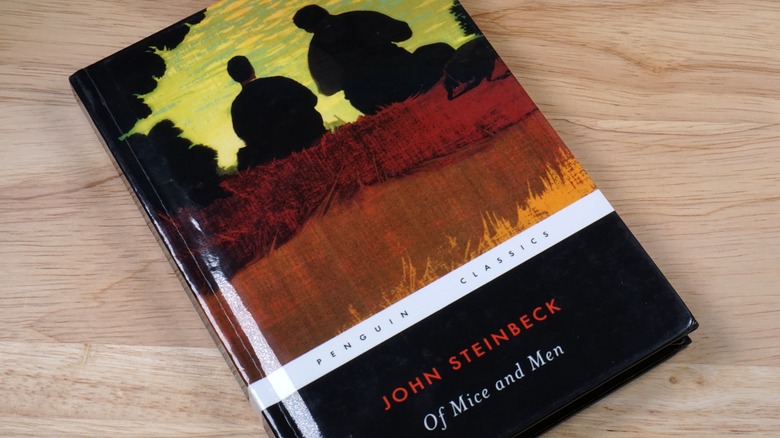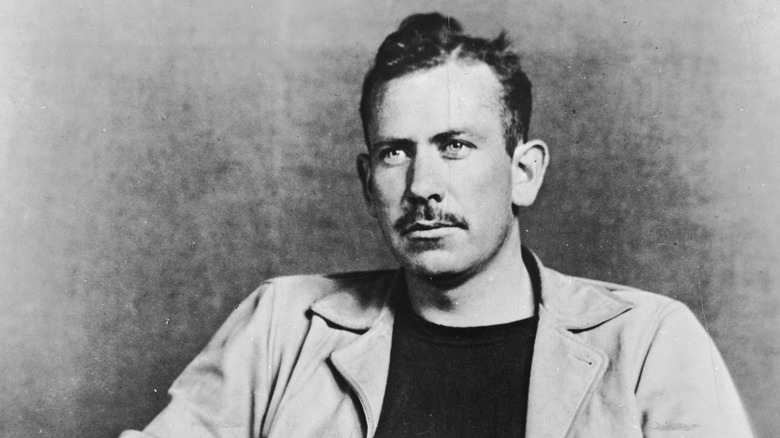The Real Reason Of Mice And Men Became A Banned Book
When it comes to American writers who had the ability to combine wit with the injustices of the everyman in the first half of the 20th century, often during The Great Depression, John Steinbeck nailed it. Although he won the Pulitzer Prize for "The Grapes of Wrath," which is considered his masterpiece, it's his novel "Of Mice and Men" that often finds its way into high school English classes — and banned from high school English classes and entire school districts as a whole.
With "Of Mice and Men," there are more than a few grievances. There is, as is the case most of the time, an issue with language that was deemed profane (via Insider). This profanity included racism, sexual content, and the characterization of mentally disabled people. However, when writing about two men — one of whom, Lennie, is mentally disabled — taking menial jobs across the United States during The Great Depression in the hopes of eventually achieving the American dream, the language conveyed the reality of the situation and portrayed the characters honestly.
But profanity isn't the only reason why "Of Mice and Men" has been banned or challenged over 50 times since its 1937 publication (via American Library Association).
The book's use of religious wording has come under fire
While one may assume blasphemy and concerns about it would have died out decades ago, when it comes to "Of Mice and Men," John Steinbeck's use of the word God has rubbed school districts the wrong way for decades. In 1977 South Carolina, the book was even challenged by the Fourth Province of the Knights of the Ku Klux Kian (via Banned Library). It was the taking of God's name in vain that had the alarming group all up in arms about the book, and the grievances didn't stop there.
In 1998, a school library in Bryant, Arkansas wanted the book banned because it "takes God's name in vain 15 times and uses Jesus's name lightly" (via American Library Association). While the book is only 107 pages, a dedicated individual certainly took the time to count Steinbeck's inclusion of such religious verbiage.
But that's just two examples in which the book was challenged about the language around God — the list goes on and on.
Steinbeck himself has raised questions over time
The question of whether we can separate the art from the artist has been asked over and over, especially in the last several years (via The New York Times). Can we still enjoy Picasso despite knowing of his past indiscretions? Can we still watch "House of Cards," with what we now know about Kevin Spacey? But in one case of trying to ban "Of Mice and Men," it was John Steinbeck himself and his "questionable" patriotism that led to his book being challenged in 1989 in Chattanooga, Tennessee (via American Library Association).
The Nobel Prize-winning author was one of many artists who found himself on FBI director J. Edgar Hoover's hit list. For almost half a century, Hoover was obsessed with ridding the country of those he deemed enemies (via The Guardian). Hoover's very long list of people he wanted to ruin included Dr. Martin Luther King, Albert Einstein, Billie Holiday, and Eleanor Roosevelt, just to name a few (via Ranker).
In some cases, people were on Hoover's list simply because he had a personal gripe, while in other cases it was because they spoke out against the government, which was seen as anti-patriotic. In 2010, John Steinbeck's son, Thomas, wrote about his father's patriotism, quoting his father as having said, "If the solution to a problem of absolute disagreement extends to a call for bloodshed, then neither party has demonstrated the intelligence to formulate the question properly" (via HuffPost).
While "Of Mice and Men" is standard reading in many high school English classes, it's likely we haven't seen the end of its controversy.


